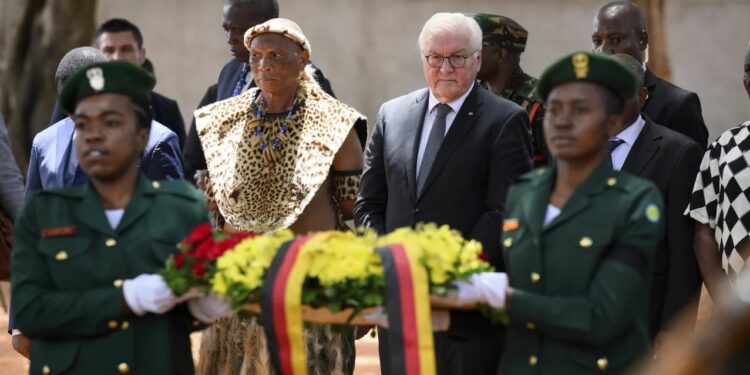By John Ikani
German President Frank-Walter Steinmeier has openly expressed deep remorse for the colonial wrongs inflicted by his nation upon Tanzania.
In a somber reflection, President Frank-Walter Steinmeier acknowledged the grim past, where German forces were responsible for nearly 300,000 lives lost during the Maji Maji rebellion – a poignant chapter in anti-colonial resistance.
Speaking at a museum in Songea, the very heart of the historical turmoil, President Steinmeier extended his heartfelt plea, saying, “I would like to ask for forgiveness for what Germans did to your ancestors here.”
His words resonated with the profound shared history between the Tanzanian people and the people of Germany.
The Maji Maji rebellion had its roots in a German policy aimed at compelling the local population to cultivate cotton for export.
The conflict unfolded within the boundaries of German East Africa, which encompassed modern-day Rwanda, Burundi, and parts of Mozambique.
With empathy and humility, President Steinmeier expressed hope for Tanzania and Germany to collaboratively come to terms with this shared history.
He pledged to carry these stories back to Germany, ensuring that a broader audience in his homeland would become aware of this significant, albeit painful, historical period.
For years, Germany had grappled with a troubling “colonial amnesia,” as highlighted by Jürgen Zimmerer, a history professor at the University of Hamburg.
Zimmerer noted that the brutality and racism of this colonial era had been insufficiently understood by the German public.
As part of his three-day visit to Tanzania, President Steinmeier had a poignant encounter with the descendants of Chief Songea Mbano, one of the leaders of the Maji Maji rebellion who met a tragic fate in 1906.
Chief Songea Mbano now stands as a revered national hero in Tanzania, and the president assured his family that German authorities would endeavour to locate his remains.
During the colonial era, numerous human remains were transferred from German colonies, partly as “trophies” and partly for racist research.
Professor Zimmerer lamented the challenge of acquiring adequate funding to identify the origins of these bones and skulls, which are currently housed in various museums and institutions.
Nonetheless, there have been instances where descendants of those affected have managed to trace their ancestors’ remains with the aid of DNA tests.
In a different vein, after meeting with President Samia Suluhu Hassan in Dar es Salaam, President Steinmeier pledged to work with Tanzania towards the “repatriation of cultural property.”
While the president’s apology was met with appreciation, Tanzania historian Mohamed Said noted that it fell short of addressing the full scope of the atrocities.
He pointed out the stark reality of German forces intentionally setting farms ablaze, depriving people of food and the ability to resist – actions that would be considered unacceptable in today’s world and subject to legal consequences.
Notably, in 2021, Germany officially recognized its genocide in Namibia during the colonial occupation and announced financial aid exceeding €1.1 billion. This recognition stands as a significant step in reckoning with historical injustices.
In a similar vein, Germany’s president’s statements followed King Charles’s acknowledgement of the “abhorrent and unjustifiable acts of violence committed against Kenyans” during their quest for independence, expressed during his visit to Nairobi.
However, it’s crucial to note that this acknowledgement didn’t constitute a formal apology, which would require a decision by government ministers.



































